25 Medical Myths That Just Won't Go Away
Myth: Fingernails and hair continue to grow after death.
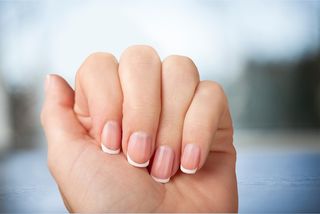
This myth is actually just a misperception, and for many years, most physicians couldn't disprove it, even though they couldn't quite explain it. Here's what really happens to your nails and hair after you die:
"As the body's skin is drying out, soft tissue, especially skin, is retracting," Vreeman said. "The nails appear much more prominent as the skin dries out. The same is true, but less obvious, with hair. As the skin is shrinking back, the hair looks more prominent or sticks up a bit."
Myth: Shaved hair grows back faster, coarser and darker.
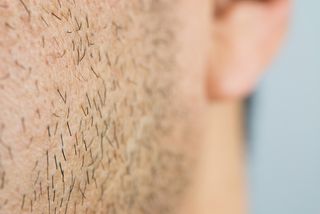
Here's a myth you can debunk yourself by paying attention to your own hair after shaving. You may notice that new hair grows in with a blunt edge on top. Over time, that blunt edge gets worn down, making it seem thicker than it really is. But why might recently shaved hairs seem darker than their nonshaved counterparts? It could be that those newly spouted hairs haven't yet been bleached by the sun, Vreeman said.
But if you don't trust your own experimental skills, there's other evidence that this myth isn't reality. A clinical trial conducted in 1928 compared hair growth in shaved patches to hair growth in nonshaved patches. The study found that new hair that replaced shaved hair wasn't darker or thicker, nor did it grow faster. More recent studies have confirmed that one.
Myth: Eating turkey makes you drowsy.
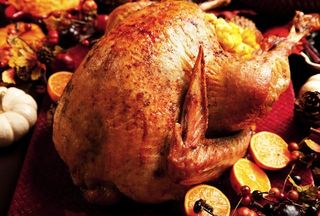
Your excuse for taking a nap after dinner on Thanksgiving just went out the window. While turkey does contain a chemical called tryptophan that is known to cause drowsiness, your serving of Thanksgiving bird doesn't contain any more of the chemical than a similar-size serving of chicken or beef, Martha Stipanuk, a professor of molecular nutrition at Cornell University, told NPR in 2008.
So why do people feel so sleepy after a Thanksgiving feast? It could be the overall quantity of food you eat on this holiday that makes you drowsy. Those heaping mounds of carbohydrates on your plate (think dinner rolls and mashed potatoes), plus a few alcoholic beverages, will almost certainly make you feel tired, according to experts.
Myth: Ulcers are caused by spicy food and stress.
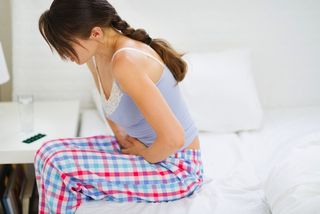
If you think your ulcers are acting up because of the curry you ate last night for dinner, think again. Although doctors once believed that ulcers were caused by stress, lifestyle choices or spicy foods, they now know that most ulcers are actually caused by the bacterium Helicobacter pylori.
Ulcers — sores that develop in the lining of the esophagus, stomach or the first part of the small intestine — can also be caused by certain medicines. Aspirin and iron tablets are the most common culprits, according to Dr. Arun Swaminath, director of the Inflammatory Bowel Disease Program at Lenox Hill Hospital in New York City.
Myth: A woman can't get pregnant during her period.
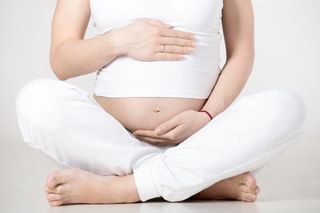
Although it's unlikely that a woman will conceive during menstruation, it isn't impossible, according to Carroll. Sperm can live inside a woman's body for up to a week, and ovulation can occur soon after (or even during) the "bleeding" phase of a woman's menstrual cycle. That makes it possible for a woman to become pregnant if she has sex either during her period or shortly after it ends.
Myth: You lose most of your body heat through your head.
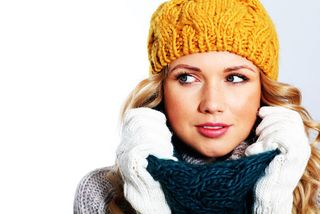
Don't believe the hat salesman: You don't lose most of your body heat through your head.
In 2006, scientists decided to debunk this myth once and for all. They found that the amount of body heat lost through a person's head is only about 7 to 10 percent of total body heat. In other words, body heat loss from the head is proportional to the amount of skin on the average human head.
Myth: Going out in the cold with wet hair will make you sick.

Don't have time to dry your hair before leaving the house on a cold day? Don't worry about it! Though lots of people might tell you that a wet head, plus cold air, is bound to equal a head cold, that's simply not the case, according to Weiss. Germs such as viruses and bacteria, not temperature changes, make people sick. So although you might be a bit chilly if you leave home with wet hair on a winter day, that doesn't mean you'll get sick, he said.
However, a study published in 2015 in the journal Proceeding of the National Academy of Sciences does suggest that rhinoviruses (the viruses behind the common cold) may take advantage of cold weather. Researchers found that cold temperatures might make it easier for these cold-causing viruses to replicate by diminishing the body's antiviral immune responses.
Myth: Deaths by suicide increase over the holidays.
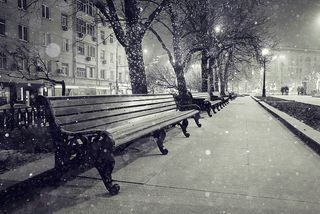
Here's a myth you've probably heard every December: The number of people who die by suicide increases during the holiday season. But that's actually not the case. In fact, suicide rates in the U.S. are lowest in December, according to the Centers for Disease Control and Prevention's (CDC) National Center for Health Statistics.
One reason for this myth may be the way the media covers deaths from suicide. A recent analysis of media reports written during the 2013 holiday season found that 70 percent of published articles perpetuated this myth.
The number for the national suicide hotline is 800-273-8255.
Myth: Poinsettias are toxic.

Poinsettias aren't toxic. We repeat: Those beautiful flowers you've been so wary of keeping in your home during the holidays (lest they poison pets or children) are not toxic.
The plants can make people sick, but there have been no definitive cases of a person dying from exposure to a poinsettia plant.In a paper published in the Southern Medical Journal in 1996, researchers reviewed 22,793 cases of poinsettia exposure that were reported to poison control centers over a seven-year period. They found that not one of those cases was fatal. The most severe reactions reported were stomachaches and cramping.
The myth about poinsettias being toxic may have come from a case, reported in 1919, of a 2-year-old in Hawaii who allegedly died after ingesting parts of the plant, according to a 2012 article in the Western Journal of Emergency Medicine. But the child's death was never confirmed, nor was the cause of death.
Myth: Chicken noodle soup cures … everything.
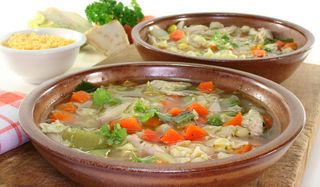
p> Everybody's heard that chicken soup is supposedly the best cure for whatever ails you. But does this delicious food really help you get better when you're sick?
Unfortunately, no, Weiss said. The combination of hot broth and yummy veggies is more of a comfort than a cure, he said. However, some research suggests that chicken noodle soup may work well as a placebo. In other words, it may convince you that you're getting better. So keep slurping!
Sign up for the Live Science daily newsletter now
Get the world’s most fascinating discoveries delivered straight to your inbox.

